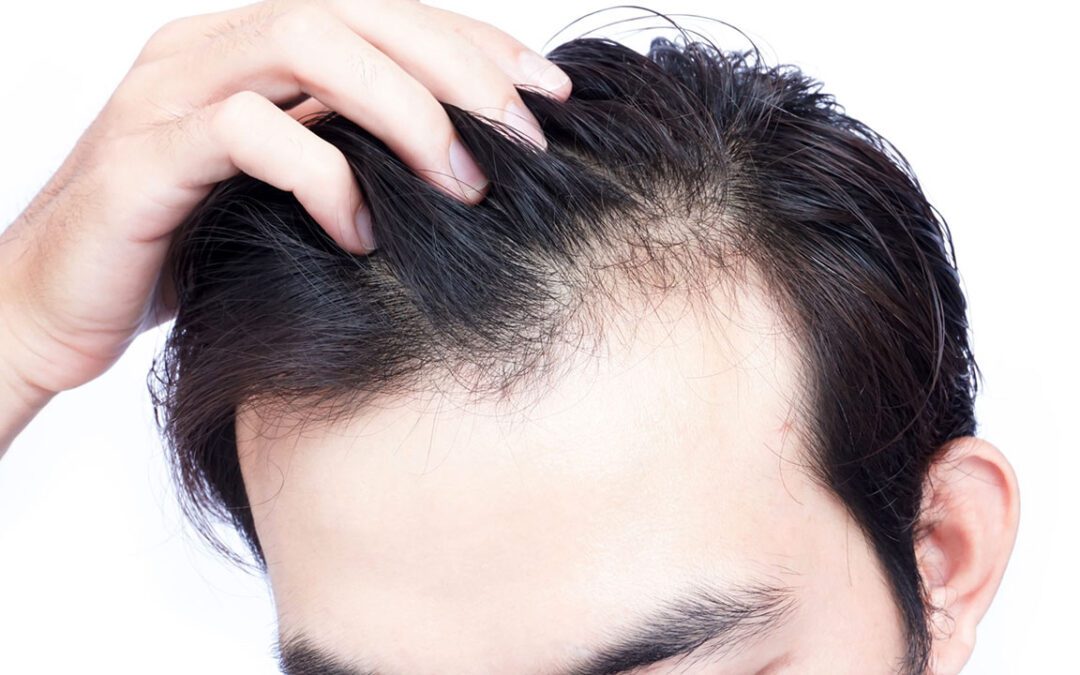Hair fall is a major condition that influences people from all age groups and genders, the factors responsible for this include family history and some underlying medical conditions. At Ivitality, we aim to provide efficient and effective preventive measures for hair fall, along with elaborating on the related causes.
Types of Hair Fall
The problem of hair loss is seen everywhere and at very high rates. This can be caused by life choices, genetics, and the environment in which we live. Gaining knowledge on different forms of hair fall will allow individuals to identify its root cause as well as implement suitable remedies – here are the five primary forms:
- Androgenetic Alopecia (AGA): In both men and women it happens but in different ways. For men, this is shown by less hair growing everywhere and going back from the front to the sides of their heads. When women show this problem, they usually don’t lose hair evenly across the middle of their heads but keep it near their foreheads.
- Telogen Effluvium: Losing hair a little bit can be connected to telogen effluvium. This is usually caused by big emotional or physical stress or certain medicines.
- Alopecia Areata: Alopecia areata is an issue where the body’s protection system attacks hair roots. This causes your hair to fall out in some areas of your body.
- Traction Alopecia: When you pull on the hair for a long time, it can cause hair loss called traction alopecia.
- Scarring Alopecia (cicatricial Alopecia): Hair loss, happens due to scars on the head. This causes hair to drop out, and it’s a lasting issue that won’t disappear quickly.
It’s vital to know the kind of hair fall someone has and what makes it happen. This helps integrative medicine doctors treat them properly.
Learning Why Hair Falls Out
To prevent hair fall and find a better answer, we need to know why it’s happening first. There may be multiple causes – here are the primary culprits:
- Genetics: If you have some family members with baldness, then the chances of having this gene are higher in you as well.
- Hormones: The increase or decrease in the testosterone level will have great effects on hair growth.
- Medical Conditions: Issues regarding health are inclusive of hypothyroidism or hyperthyroidism, and these contribute toward hair fall.
- Medications: Although it is common among people that chemotherapy drugs for cancer cause hair loss in its wake, what we don’t know is the science behind this process.
- Lifestyle Choices: Four different ways can be harmful in terms of hair health. They include smoking, high-stress levels, and a diet that is not healthy enough with essential coal groups that support hair strength.
To select the best action plan, it is really important to figure out why hair loss is occurring in the first place.
Preventing and Treating Hair fall
Hair loss can be distressing, yet proactive steps may help halt further hair thinning while stimulating new regrowth in some instances. While no single solution exists for managing and treating this concern effectively, here are a few measures and treatments available:
- Consultation with a Doctor: If you’re losing hair or see changes in its thickness, talk to a special skin doctor or person who knows medicine is important. They can help solve the problem and give advice just right for you.
- Medications and Treatments: There are many drugs and treatments for different types of hair loss. One approved by the FDA is Minoxidil which helps slow down losing your hair while also helping new ones grow stronger at the same time.
- Finasteride: Finasteride is one of the medicines made to be taken in. Mainly made to help men stop hair loss and also boost the growth of new hair by stopping the making of DHT.
- Platelet-Rich Plasma (PRP) Therapy: The therapy called platelet-rich plasma works by using a little bit of blood from it in the treatment.
- Adopt Good Hair Care Habits: Good haircare practices can contribute to healthier locks and help stop further loss. Focus on gentle handling when towel drying your locks and use a wide-tooth comb with wide teeth for increased breakage prevention.
- Avoid Tight Hairstyles: To prevent traction alopecia, avoid hairstyles which pull at your hair too tightly and use mild products instead, such as shampoos and conditioners without excessive heat styling heat styling is recommended.
- Nutrition and Lifestyle Changes: Eating right is crucial to hair health; try including foods rich in proteins, biotin (especially Vitamin D3) iron and omega-3 fatty acids in your daily routine to promote better hair health. Also:
- Manage Stress: For reduced hair shedding caused by stress-relief methods such as yoga, meditation or mindfulness practices.
- Quit Smoking: Smoking can impair blood circulation to hair follicles affecting their health negatively and hasten their decline over time.
- Scalp Care and Massages: Rubbing the head daily can improve the blood flow to the hair follicles and improve hair growth.
- Hair Restoration Procedures: People looking for better answers to fix their hair loss might want to try big treatments like hair restoration and using light therapy. These can be possible solutions too.
Peptide Therapy for Hair Growth
Hair fall affects millions of individuals worldwide and causes immense distress due to its multiple sources. There are various treatments for this issue available today; among these is peptide therapy as a promising approach for encouraging new hair growth and restoration. Peptides contain amino acid chains which play vital roles in our bodily processes such as the repair of damaged cells. Peptide therapy involves applying specific peptides directly onto the scalp to stimulate follicles and encourage hair growth.
GHK-Cu, an amino acid tripeptide linked with copper atoms that are found naturally in our bodies blood and cells, offers various health advantages:
- Anti-Aging: It helps the skin by increasing elasticity, and decreasing wrinkles. This in turn protects cells providing them longer life spans.
- Wound Healing: If cells are more motivated, and faster in migration no doubt any wound or injury will heal before the expected time
- Neuroprotection: It stimulates the growth of nerve cells and provides them security against any damage.
- Hair Growth: It is beneficial in increasing the hair count.
- Skin Health: Better skin health is achieved by two major effects where collagen production moves up and any inflammation is reduced.
Usage of GHK-Cu
GHK-Cu is used in products for anti-ageing and could come in various forms such as creams, serums or injections. Usually, most people can tolerate it; but some may experience redness, dry skin and itching that go away over time. While there are no side effects of GHK-CU when it is used in proper dosage, it is still very necessary to ask the healthcare provider if you are pregnant and have any underlying health condition.
What Ivitality Can Offer You?
At Ivitality, we specialize in functional medicine services focused on hair restoration and functional medicine solutions tailored specifically for each of our clients’ needs. This expertise includes:
- Determining Hair fall Causes
- Customized Treatment Plans
- Hair Restoration Services
- Functional Medicine Approach
- Professional Guidance & Support
Ivitality, our primary concern is listening carefully and crafting personalized solutions tailored specifically for you to regain confidence and optimise hair health. Don’t hesitate to seek assistance and explore tailored solutions designed specifically to restore hair growth!

